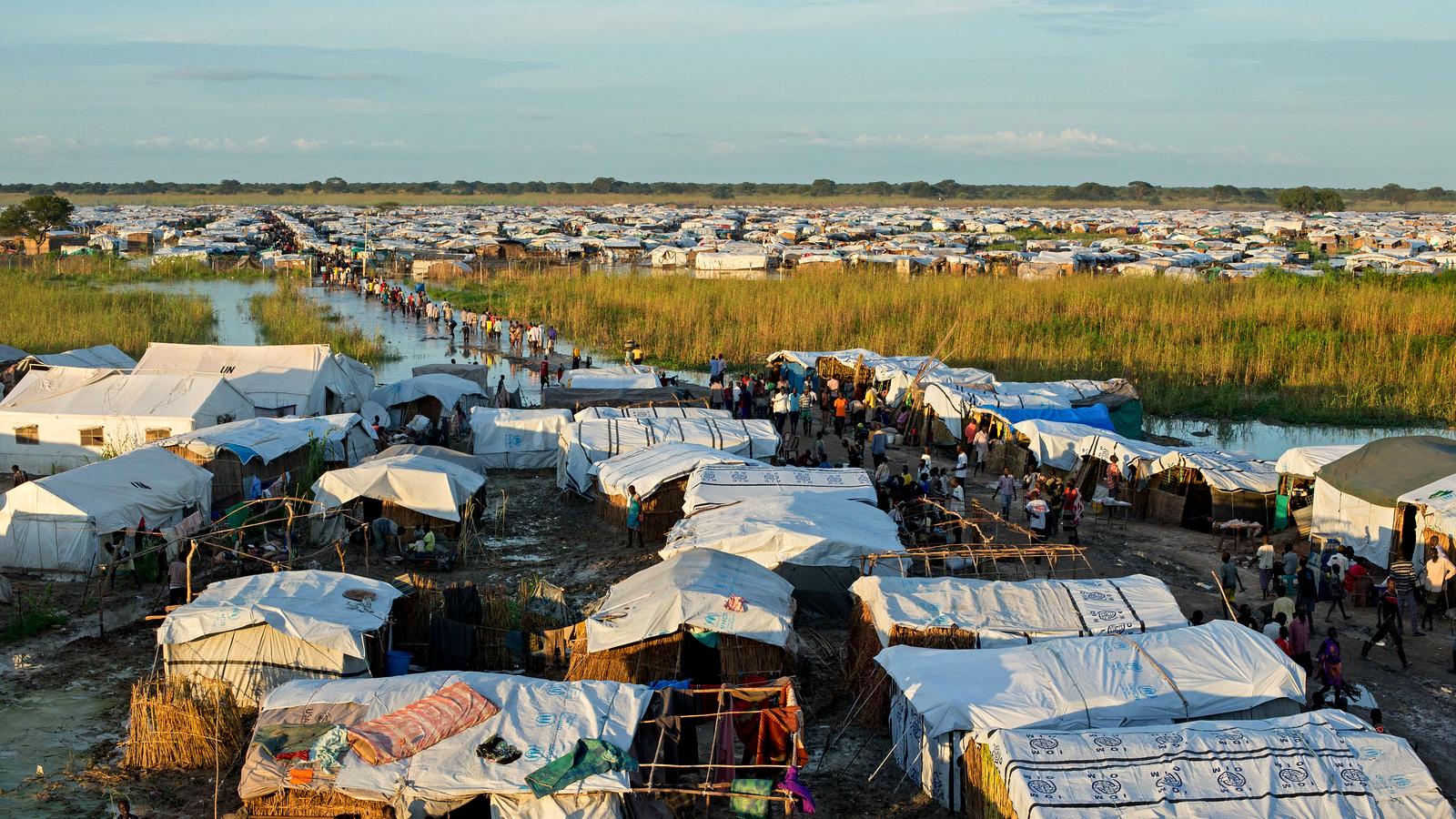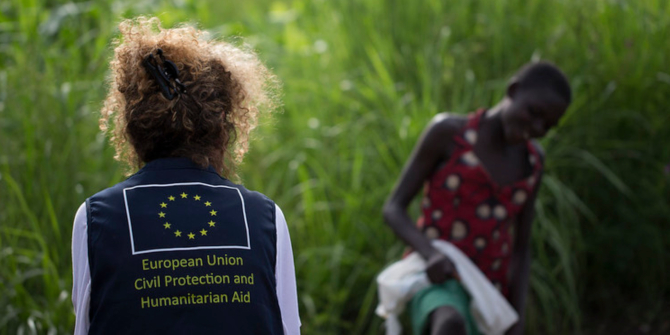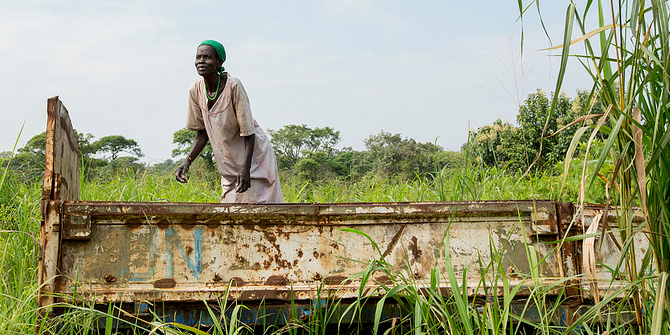Research into international development processes in South Sudan suggests civil society groups have been nurtured to mimic international NGOs. Based on a narrow perception of how legitimate civil society should function, these actors appear to have deprioritised connection with their communities as a means of deriving public authority.
This post results from the research project ‘Historical and Political Dynamics of the NGO Sector in South Sudan’ hosted at the LSE Firoz Lalji Centre for Africa.
There are many ways ‘civil society’ has been interpreted and used, to the extent that there is no conclusive definition of the term. Despite this complexity, there is some consensus that it represents the forms of social organisations that exist between the family and the state.
Critics argue that civil society is a ‘western’ idea, as it emerged from the political realities of Europe which do not reflect the realities of many African societies. Lemarchand, for example, notes there are no clear distinctive relations between the ‘state’ and ‘society’ in many African contexts. He notes that state-society relations in Africa constantly evolve as they interpenetrate each other in complex ways.
In South Sudan, the law defines civil society as non-governmental and non-profit organisations that have a presence in public life, expressing the interests and values of their members or others, based on ethical, cultural, scientific, religious or philanthropic considerations. These would include, but are not limited to, NGOs, press and media groups, community-based organisations, women groups, youth groups, religious associations, traditional and cultural groups, market associations, trade unions and so forth.
Within an international development framework, however, African civil society is often assumed to take the form of local NGOs, most of which are funded by transnational donors and have mission statements and clearly defined objectives. Lemarchand argues such approaches overlook the contextual realities of African civil society and create significant implications for how civic actors evolve and are supported. Understanding the contextual ‘lived realities’ of civic actors is critical to setting models of international development that actually respond to the realities of how civil society claim and influence public authority.
Public authority in this case refers to any institution beyond the organisation of a family that enjoys a degree of public consent. In many African contexts, different actors including civil society organisations exercise public authority and yet the actors may not necessarily be identified as either public or private. In South Sudan, for example, civil society actors such as customary chiefs have contributed to justice, peace and security. In their daily activities and dealings with the state and their communities, civil society intentionally and unintentionally shapes and constructs public authority.
How civil society constitutes and competes for authority, however, remains significantly overlooked by international development frameworks. Of critical concern is how international development has conceived African civil society as largely based on western societal structures. ‘NGOs’ are often approached as the more lucrative form of civil society, neglecting other forms of social organisation and influence.
My research in South Sudan finds that international development processes that often assume ‘NGOs’ as the vanguard of civil society has led to a nurturing of civil society groups that mimic international NGOs. This narrow perception of how civil society should function to be legitimate has led civil society actors to deprioritise connection with their communities as a means of deriving public authority.
Due to decades of conflict in South Sudan, the boundaries of who is considered a part of civil society have evolved. The conflict limited the government’s ability to administer control and force over its territories and allowed a significant amount of public authority to be administered outside of central state control, including by militia groups. This enabled a broad base of social organisations to emerge including through financing from international organisations. Traditional chiefs, for example, played a significant role mediating and resolving disputes, and greatly contributed to limiting military authority.
During the period 1956 to 2005, very few indigenous NGOs existed in Southern Sudan. The few that existed were mostly faith-based organisations, such as the South Sudan Council of Churches and the Islamic Council. Others were advocacy groups based on grievances that largely operated in the diaspora. International humanitarian engagement in the 1990s through the Operation Lifeline Sudan (OLS) resulted in the formation of South Sudanese NGOs. This was driven by a scarcity of pre-existing organisations that could deliver aid. Organisations that were formed included the Joint Relief and Rehabilitation Committees (JRRCs), Community-Based Relief Committees (CBRCs), Inter-Church Committees (ICCs) and Village Health Committees (VHCs). It is questionable whether these organisations sustainably and authentically represented their communities because they were externally influenced and were critiqued for serving International non-governmental organisations (INGOs) interests.
Most of the national NGOs that emerged following the Comprehensive Peace Agreement (CPA) were shaped by Western narratives that equated civil society to NGOs. The donor community largely ignored the existence of traditional forms of association and focused on creating, funding and nurturing civil society organisations that were closer to western models, with the aim of finding support for their state-building agenda in South Sudan.
In this context, civil society authority is gained through registration with the government, the paying of taxes and the conforming to certain humanitarian principles. A civil society activist I interviewed explained that ‘civil society should have codes of conduct that make them look like humanitarian organisations. If you are not registered, then you are not civil society. If you do not have these standards, then you are not civil society. Civil society needs to have particular objectives and need to have an office for them to be legitimate.’
South Sudan’s case demonstrates how some ‘briefcase’ civil society groups have been set up precisely to gain from the influx of developmental aid, rather than the traditional altruistic motivation of responding to the needs of people.
An NGO worker argued that civil society organisations in South Sudan lack moral legitimacy, and questioned their authority. He noted that many civil society organisations are set up as instruments of employment, to access money from international development opportunities, and not really with a genuine change agenda. He views these civil society organisations as lacking the legitimacy to affect change.
But it is unfair to generalise all civil society actors are solely engaged as lucrative employment. Civic actors working in civil society organisations find themselves trapped negotiating their authority and legitimacy. Legitimacy from constituency often requires navigating other forms of authority to stay relevant, whereas legitimacy from donors found in registering and having an office often in an urban area in effect drives them away from their constituencies.
Massoud (2015) narrates how capacity building in South Sudan has taken the form of national NGOs mimicking the internal procedures and structures of international NGOs. He notes that the content of capacity building programmes generally focuses on training civil society actors to follow the routinised daily practices of employment in a bureaucratic context.
In South Sudan, the ‘professionalisation’ of civil society based on western definitions has pressured genuine localised actors and activists into professional donor recipients, serving international standards and advocacy structures, and in effect weakening their agency and disconnecting them from their communities.
Rather than viewing civil society through a westernised lens, global northern NGOs and donors need to recognise the existing forms of legitimacy and authority that civic actors possess, and respect that they should shape their own agendas to community needs and grievances. Local civil society organisations also need to situate themselves in ways that allow them to sustain a local connection and work on behalf of their constituency.
Photo: ‘Internally Displaced in South Sudan’ by Un Photo/Isaac Billy is licensed under creative commons (CC BY-NC-ND 2.0).






Very informative read
Dear Jimmy, thanks for putting up this literature together, it is very interesting to read and share with other institutions and colleagues
Good read. Very relevant